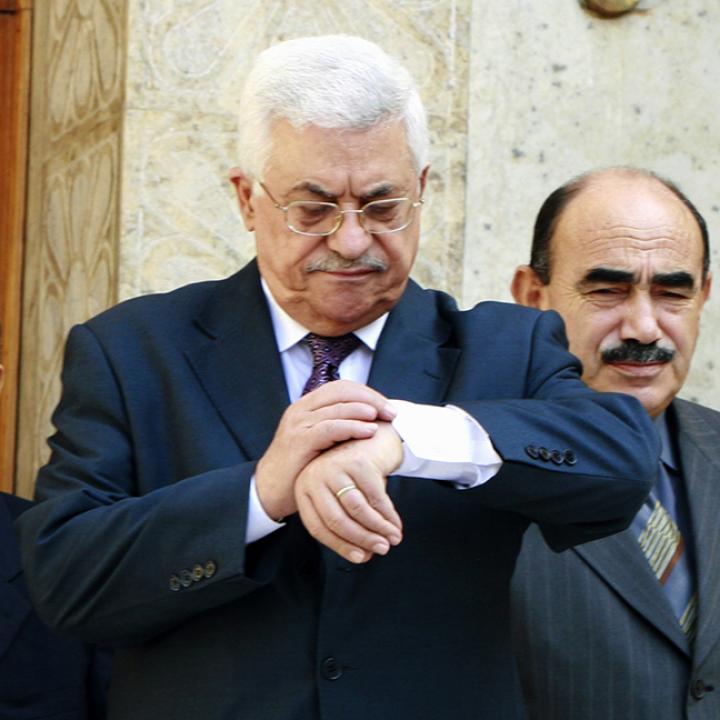

President Abbas has long ensured that no new leaders would come to the fore as realistic successors, but while this may have helped him consolidate control over a fractious polity, it is potentially ruinous as a national strategy.
On a quiet Friday afternoon last December, a rumor that began as a whisper quickly became a shout. Palestinian President Mahmoud Abbas, the story went, was rushed to the hospital with an undisclosed ailment. Abbas' supposed health scare set off a worldwide frenzy of speculation on social media until he finally appeared in a Ramallah grocery store later in the day, shaking hands and pinching babies. This rushed public appearance among the people -- a rare occurrence for Abbas -- was broadcast live on Palestinian television. The message was made clear: Abbas is fine, and still in command. The question that needs to be asked, however, is what happens when this is no longer true.
Abbas recently turned 80 and is known to be an industrious smoker. His successor by law is the speaker of the Palestinian Legislative Council, Hamas official Aziz Duwaik. Duwaik is currently imprisoned in Israel, but even if he were free, there would be no chance of a parliamentary speaker from Hamas taking the reins of power in the Palestinian Authority. The Palestinian parliament has not met in over seven years, and Abbas himself is now a decade into a four-year presidential term that began in 2005. Laws regulating transitions of political power are thus irrelevant: Abbas rules by presidential decree in the West Bank; Hamas rules by the gun in the Gaza Strip. Presidential and legislative elections have been suggested for some time, yet neither Hamas nor Fatah likely want them to take place in the near future.
Legalities aside, the clear assumption is that the next president after Abbas will hail from Fatah, which continues to dominate Palestinian political life. No clear successor has come to the forefront, however, let alone one that has been officially designated by the party. Fatah's Central Committee, the movement's top decision-making body, remains weak; the pool of potential candidates is both too large and too shallow. As one well-connected official in Ramallah stated pithily last year, "The next president will be a Palestinian and a patriot."
The party's internal disarray was supposed to be remedied during the seventh Fatah General Conference, which was originally scheduled for August 2014. This would have been the most recent meeting of its kind since 2009, but it was pushed back due to the conflict in Gaza between Israel and Hamas. A rescheduled January date came and went, and local elections for delegates to the conference are still ongoing. The Fatah General Congress agenda was rumored to include the creation of a vice-presidential post, although this is now on hold alongside the conference. Without a conference, it is impossible to accurately assess who holds power within Fatah's leadership and, perhaps more importantly, to effectively reenergize the movement.
Palestine's crumbling political institutions stand in sharp contrast to how Abbas himself became president, in the last -- and only -- instance of Palestinian leadership succession in late 2004, following Yasser Arafat's death. The Palestinian Liberation Organization and Fatah hierarchy moved within hours to resolve the issue of succession, and Abbas' only other competitor, Ahmed Qurei, conceded gracefully. Once selected, Abbas' election in the 2005 presidential election was all but guaranteed. It is indicative of Palestine's political processes that Abbas or Qurei were implicit heirs to power after Arafat's death. Both were members of the Palestinian national movement's founding generation, making their ascension to power inevitable. Today, however, there are no such identifiable candidates from within Fatah, with either the longevity or political stature.
Abbas has been leading the Palestinian Authority for a decade now, nearly equal in time to Arafat. In this period, Abbas has ensured that no new leaders would come to the fore as realistic successors. This might have made for good politics locally, allowing him to consolidate control over a potentially fractious polity. But as a national strategy, it could be ruinous for Palestinians as a whole. The Palestinian Authority cannot afford a leadership crisis if Abbas were to leave office; it already finds itself divided between Gaza and the West Bank, hamstrung by a moribund peace process, and facing growing discontent in the streets and refugee camps.
A Palestinian state requires many things in order to be viable: economic opportunity, territorial contiguity, natural resources, and working institutions. For a people intent on attaining self-determination, it behooves the Palestinians, as well as the international community, to ensure a smooth transition process after Abbas.
Ghaith al-Omari is a senior fellow at The Washington Institute. Neri Zilber is a visiting scholar at the Institute. This article originally appeared on the Foreign Affairs website.
Foreign Affairs




